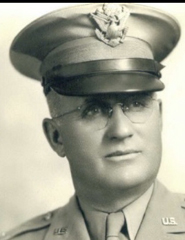Iowa Sergeant Found Nazis Were a Treacherous Group
By Frank Miles
Iowa Daily Press War Corespondent
Somewhere in the Mediterranean War Theater (IDPA) -- Sgt. Harold Wilson of What Cheer, Iowa, at the age of 33, neither young nor old among soldiers, is the type of fighting man who unconsciously raises a civilian's faith in the strength of America.
He's tall, agile and pleasant mannered but he could be and often has been hard as steel. He smiles when he talks with friends but a glint comes in his eye when he speaks of Nazis, especially some of the treachery in the battles in which he has seen action.
"They ran out tank's white flags at Anzio," he said, "then their gunners opened fire on our men who moved up to capture them. I was glad some of our tanks came up about then and tore the Jerries to pieces. I saw their booby traps and mines in Africa and I have seen them in many places in Italy. A German prisoner once told some of my comrades and me they had been told the Yanks were fair fighters. We asked him why the Nazis didn't fight. He said they thought they did. Well, I never have seen Americans use such tactics as they do."
The sergeant had been overseas almost 32 months when we met. He came across with an Iowa infantry unit to which he was assigned after being inducted from his job on an Iowa farm in Keokuk county. He was first in Ireland, then in Scotland, next in Africa where he went through months of grueling combat. He wears a combat infantryman's badge.
"I was lucky never to be hit but I saw several kids get it that I liked so well I wished I might have been any one of them," he said, sadly.
"There are a lot of Iowa boys in African cemeteries."
The sergeant was in one of the first contingents to attack Salerno. Then his outfit fought steadily up through the muddy and rocky mountains from where the Nazis fired on the advancing Americans.
"Our lads just couldn't be stopped," he related admiringly.
The rugged Iowan served six years in the United Sates navy from 1927 to 1933, spending most of that period on the U.S.S. Mississippi.
"Of course I'd like to be through with my job," he admitted, "but I'm not kicking so long as there's work for me to do."
He hadn't made any plans as to what he would do when discharged but wasn't worried.
A GREAT COUNTRY
"Any one who really wants to can get along in the United States ," he said quietly. "People back there, who are always complaining and who talk about hard times in the past make me tired when I think of how tough it is for people over here even when their in what they call good times. Most Americans don't appreciate our country.
"Are you going to vote?" I asked.
"I suppose so," he replied "but right now I'm pretty busy to be thinking about politics. Every one should vote, though."
The sergeant was greatly pleased over having met two boys from What Cheer only a few days earlier. S-Sgt. Jimmy Steward, of the air corps, and T-Sgt. Marvin Grudgen of an armored division.
"That guy is really tops," agreed two of his buddies - one from Alabama , the other from Massachusetts after he had gone.
"You said it," rejoined the New Englander.
And he struck me as one who will be quite as good a citizen in his modest ways as he is a soldier.
Shortly after my visit with Sergeant Wilson I asked two smart looking bucks where they were from.
"Minnesota." from one.
"Michigan." said the other.
Then -- "and where you from?"
"Iowa?" said the first one who had answered me. "We can beat you in football."
"So can we," retorted the Michigan GI.
Then as I prepared to give them a friendly argument a jeep came along, the driver yelled, they jumped in and away they went, with waves and grins.
Source: Ames Daily Tribune, September 28, 1944
![]()

